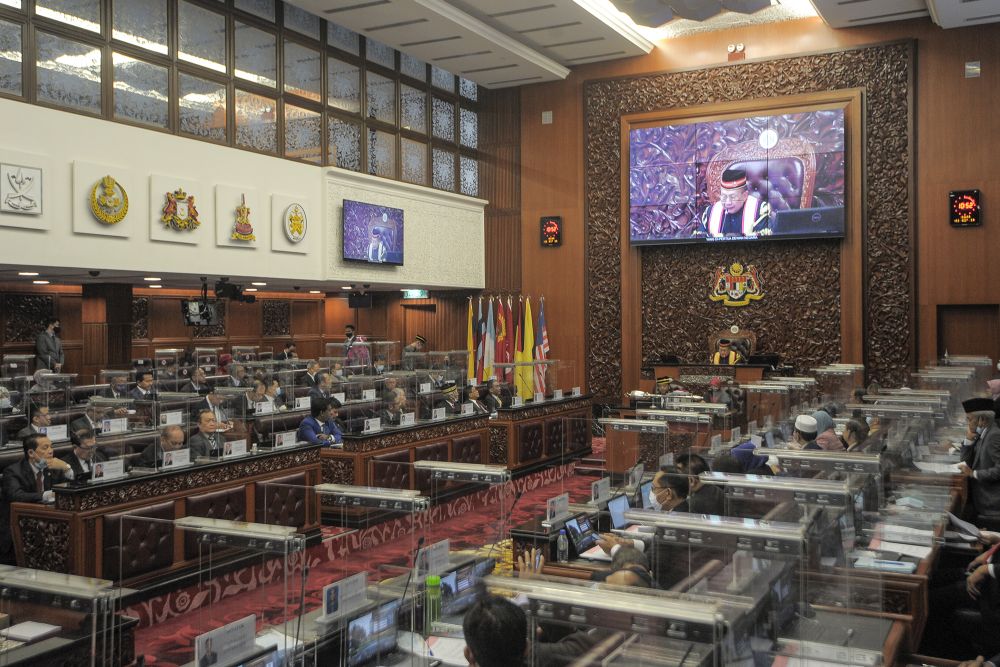.jpg)
Subscribe to our Telegram channel for the latest updates on news you need to know.
KUALA LUMPUR, April 1 — The High Court today allowed three PAS lawmakers and two PKR lawmakers to join a lawsuit by civil society groups such as Bersih 2.0 to challenge the suspension of Parliament during the nationwide Emergency here.
This lawsuit was previously filed on February 2 by Bersih 2.0 and its chairman Thomas Fann, the Malaysian Academic Movement (Gerak), Aliran, Suara Rakyat Malaysia (Suaram), the Kuala Lumpur and Selangor Chinese Assembly Hall (KLSCAH), Save Rivers, the Center for Independent Journalism (CIJ), against Prime Minister Tan Sri Muhyiddin Yassin and the Malaysian government.
The PAS lawmakers — Pasir Mas MP Ahmad Fadhli Shaari and Dewan Negara lawmakers Khairil Nizam Khirudin and Mohd Apandi Mohamad — had on March 16 filed their applications to be interveners, while the PKR lawmakers — Mohd Yusmadi Mohd Yusoff and Hang Tuah Jaya MP Datuk Seri Shamsul Iskandar Mohd Akin — had on March 19 applied to be interveners.
Lawyer Edmund Bon, who represented Bersih 2.0 and the seven others, said that both his clients and the government did not have any objections to the PAS and PKR lawmakers becoming part of the lawsuit.
“So the court ordered that they be made parties to the suit as interveners,” he told reporters when met at the court complex here after the case came up before High Court judge Datuk Ahmad Kamal Md. Shahid today.
The next case management will be on May 3.
Senior federal counsel Mohd Sabri Othman appeared today on behalf of the government, while lawyers Ahmad Amzar Ahmad Azlan and Surendra Ananth appeared for the PAS lawmakers and PKR lawmakers respectively.
In the lawsuit filed on February 2 as a public interest case, the civil society organisations including Bersih 2.0 wanted the courts to consider and decide on the role of both Parliament and the courts in ensuring checks and balances during the Emergency.
In their lawsuit, the civil society organisations are seeking for several court orders, including a declaration that the Emergency (Essential Powers) Ordinance 2021 as being unlawful and unconstitutional and invalid, or alternatively a declaration that Section 14 of this Emergency Ordinance — which suspended Parliament sittings during the Emergency — is unlawful, unconstitutional and invalid.
They also want a declaration that a constitutional amendment (Section 15(d) of the Constitution (Amendment) Act 1981) — which had added Article 150(8) into Malaysia’s Federal Constitution and with this new addition purportedly ousting the courts’ jurisdiction from deciding on the validity of Emergency ordinances — is unconstitutional for violating the Federal Constitution’s basic structure and Articles 4, 8 and 121.
They are also seeking for the courts to decide on four questions of law, including whether the Proclamation of Emergency issued on January 11, 2021 and whether the Emergency (Essential Powers) Ordinance 2021 promulgated on January 14, 2021 had to be laid before both the Dewan Rakyat and Dewan Negara without undue delay in line with the Federal Constitution’s Article 150(3), since both Houses of Parliament had not been dissolved but were only adjourned at those times.
The second question is whether Section 14 of the Emergency ordinance — which suspends Parliament during the Emergency — is valid when it prevents or frustrates Article 150(3) from operating, while the third question is whether the 1981 constitutional amendment — which added Article 150(8) is unconstitutional for violating the Federal Constitution’s basic structure and Articles 4, 8 and 121.
The fourth question is whether Article 150(8) — even if it is valid — prevents the courts from reviewing the constitutionality of an Emergency ordinance that does not comply with or prevents or frustrates or disables Article 150(3) — which would require Emergency proclamations and ordinances to be placed before both houses of Parliament.
After filing this lawsuit, the civil society organisations on March 17 subsequently also filed an application at the High Court to refer six questions of law for the Federal Court to decide on first, before the High Court hears the lawsuit.
Bon today told reporters that the government is objecting to the civil society organisations’ bid to refer the questions of law to the Federal Court, adding that the government will have to file affidavits of reply on that matter and that this would also be managed during the May 3 case management.
The six questions of law that Bersih 2.0 and the other groups want to refer to the Federal Court overlap with the four questions of law in its lawsuit at the High Court, while the two remaining questions are different.
The two remaining questions are whether the Federal Constitution’s Article 150(8)(b)(iii) only prevents the courts from reviewing the validity of an Emergency ordinance but does not prevent the review of any of the ordinance’s provisions, and whether the words “Notwithstanding anything in this Constitution” contained in the Federal Constitution’s Article 150(8) of the Federal Constitution — even if valid — includes Article 150 of the Federal Constitution.
Malaysia has been put under a state of Emergency from January 11 until the expected end date of August 1 unless lifted earlier. During this period, Parliament and state legislative assemblies — which typically play the role of checks and balance on the executive branch of the government — have been suspended until further notice.
While the Yang di-Pertuan Agong has previously clarified on February 24 that Parliament can be convened during the Emergency on a date that the Yang di-Pertuan Agong thinks is appropriate on the advice of the prime minister, the Perikatan Nasional administration has not provided such advice that would enable Parliament sittings to resume.


